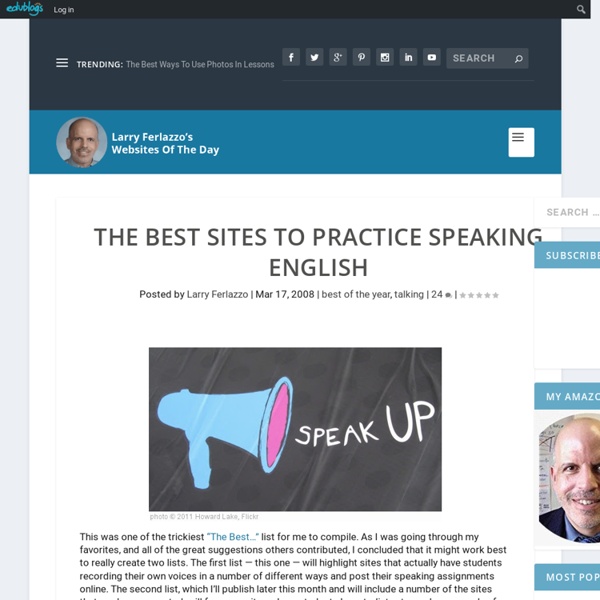Motivating speaking activities for lower levels
Planning time has been shown to increase production in speaking tasks. Lower level learners often find it especially difficult to speak spontaneously, so these activities incorporate 'thinking time' during which learners can prepare for speaking by planning what they are going to say, and asking the teacher or using a dictionary to look up missing vocabulary. The following activities are relatively short, with minimal materials preparation time for the teacher. They are designed for use as a warmer or a filler in the middle or at the end of a class. 1. Definitions lists This activity is good for activating existing vocabulary or revising vocabulary studied in previous lessons. Procedure Choose a vocabulary topic (this can be vocabulary you have recently studied or a topic you want to introduce). A faster-moving, fun alternative to this activity is a team game. 2. 3. This is a variation on the above activity and is great for practising adjectives. 4. 5. 6.
The Best Websites For Learning English Pronunciation
Ways to Help ELLs Learn Pronunciation is the headline of one of my Education Week Teacher columns. I had to make a lot of difficult choices to come up with this latest “The Best…” list. One decision I made was to focus this list more on Beginning and Early Intermediate English Language Learners, or for more advanced ELL’s who primarily would use these sites more to “brush-up” or review some basic pronunciation skills. I am developing another list that I’ll call The Best Sites For Developing English Conversational Skills. That one will probably be geared more towards Intermediate and Advanced English Language Learners, and will include more of the sites I received from readers in my call for recommendations. Several readers recommended sites using the phonetic alphabet. In addition, I had a very difficult time ranking this particular list. As with all my “The Best…” lists, links to these sites can also be found on my website. I recently blogged about Spoken Skills. That’s my list. Related
904 FREE Speaking Worksheets
Learning to speak a new language is definitely a challenge. It’s very difficult for your students to do if they don’t practice on a regular basis. Luckily, you need to look no further because BusyTeacher.org has the tools to help your students practice their speaking - and want to do it, too! Let’s face it, students aren’t always jumping for joy at the opportunity to speak a language they aren’t 100 percent comfortable with. Students can be hesitant to speak for a wide variety of reasons - fear of mistakes, peer pressure, or lack of self-confidence are some of the main factors. These worksheets are great to use for your lessons because they come in many different styles and formats. You can preview the worksheets you want to use before you download them. Do you have a worksheet, PowerPoint presentation, or game that you use in your classroom, and works like a charm every time?
Listening Exercises
TEDxESL | ESL discussion material based on TED talks
videws 1110 | Version 7
ESL students can learn English with lessons featuring audio (and/or video), a script, interactive quiz and vocabulary activities. 1150 Urban Plannning Shifani talks about making cities more efficient places to live. 1148 Scary Food Paul and Todd look at the threat of disease to the food supply. 1147 Animal Workers Paul and Todd look at animals being part of the labor force. 1146 Captivity Todd and Paul discuss animals living in captivity. 1145 Tiger Farm Todd talks to Paul about visiting a tiger farm. 1144 Ship Wrecked (2) Jeff talks about how he and his brothers survied at sea. 1143 Ship Wrecked (1) Jeff talks about surviving a ship accident at sea. 1141 Korean Wedding Sunny talks marriage in her home country of Korea. 1140 Marine Biology Dusty talks about how he got interested in marine biology. 1139 Sea Turtles Dusty talks about his experience helping sea turtles 1138 Balcony Garden Dusty talks about growing plants on an apartment window. 1122 DJ Host Shifani talks about being a bilingual DJ.
10 ESL Speaking & Listening Games
Games and fun activities are a vital part of teaching English as a foreign language. Whether you’re teaching adults or children, games will liven up your lesson and ensure that your students will leave the classroom wanting more. Games can be used to warm up the class before your lesson begins, during the lesson to give students a break when you’re tackling a tough subject, or at the end of class when you have a few minutes left to kill. There are literally hundreds, probably thousands, of games that you can play with your students. EFL games are used to test vocabulary, practice conversing, learn tenses - the list is endless. This list of ten classic ESL games every teacher should know will help get you started and feeling prepared. Don't have a job yet? 1. There isn’t an EFL teacher I know who doesn’t use this game in the classroom. This is best played with 6 students or more - the more, the better. Why use it? How to Play: 2. Why use it? How to play: 3. Why use it? 4. Why use it? 5. 6.
Wonder How To » Show & Tell for Creators & Doers
useful interview expressions game
useful interview expressions: Practice useful interview expressions game using this ESL fun Game.This game is also excellent for classroom teaching. Teachers can engage students in a classroom vocabulary or grammar review. It is suitable for intermediate and advanced esl learners. Games are great for motivating students to learn. More Games
English Grammar Online - free exercises, explanations, vocabulary, dictionary and teaching materials



